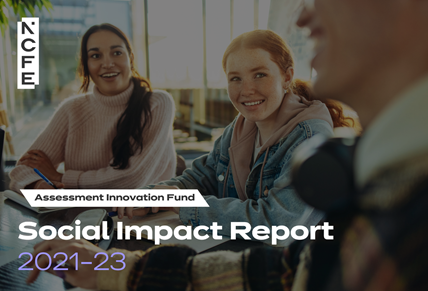Report marks two years of unique assessment innovation fund
A report has today (17 April) been launched marking two years of a first-of-its-kind fund that supports a range of organisations investigating new and innovative assessment methods.
The Assessment Innovation Fund (AIF), created by the awarding organisation and education charity NCFE, launched in 2021 following a £1 million commitment by the leader in technical and vocational education.
Over the last two years, the fund has supported 12 projects, with 3,289 learners now having participated in those pilots. In total, 206 educators across two continents and 49 institutions have been involved in AIF funded studies.
Philip Le Feuvre, Chief Operating Officer at NCFE, said: “Assessment methods often focus on recall and repetition with structures that may advantage a minority but to the detriment of others.
“We need to rethink the purpose of assessment – it should be used for more than just generating a final grade. It can and must be used to help develop skills, moving us beyond a largely high-stakes assessment system to an environment where formative assessment is embedded throughout the learning journey.
“This is why, back in 2021, we committed £1 million and created NCFE’s Assessment Innovation Fund (AIF), to support the development of new ideas and methods for assessing learners at different ages and levels, and to help fill an evidence gap in the sector.
One of the very first AIF pilots saw The Sheffield College using virtual reality (VR) in summative and formative assessment. The pilot's aim was to explore how VR can be embedded in assessment to improve learning experience and outcomes for learners.
Using the funding to purchase VR headsets and build virtual assessment experiences in animal care, catering and construction, the pilot explored the possibilities of allowing learners to develop their skills outside of the need to always be in a practical setting.
Following the experience, more curriculum areas at The Sheffield College have sought internal funding to create their own VR environments, and the headsets have also been used in other ways, including helping to desensitise neurodiverse learners ahead of a trip to an off-site location, allowing the entire cohort to attend.
Steven Spence, Assistant Principal for Teaching, Learning, Assessment and Innovation at The Sheffield College, said: “We were delighted to be funded through NCFE’s Assessment Innovation Fund, enabling us to conduct a pilot investigation into the use of virtual reality (VR) on assessment.
“Although the results were positive for the students in the project and will impact on how we at The Sheffield College utilise VR in the future, we really hope that this pilot opens new doors to assessment across the sector, including influencing how awarding bodies design future assessments.”
Philip Le Feuvre added: “There’s a need for rigorous, funded investigations into a range of innovative assessment methods that bring clarity to the sector. If we can fill the evidence gap through research, collaboration and investment, we can move the sector closer towards consensus on what form assessment innovation takes.”
In its first two years, NCFE’s AIF generated over £1.5 million in social value, meaning for every £1 that has been invested, £1.70 was generated as a result. It has funded pilots exploring everything from artificial intelligence and digital badging to virtual escape rooms and simulation centres.
The work hasn’t stopped there. In November 2023, NCFE announced a new partnership with Ufi VocTech Trust and recently closed its latest funding window, with new AIF pilots to be announced in the coming months.
To find out more about the Assessment Innovation Fund's impact, you can read our two-year impact report here.
There’s a need for rigorous, funded investigations into a range of innovative assessment methods that bring clarity to the sector. If we can fill the evidence gap through research, collaboration and investment, we can move the sector closer towards consensus on what form assessment innovation takes.
You can read the AIF Social Impact Report 2021-23 now

Unique project connects importance of self-leadership, learning power, and student engagement
An innovative pilot, undertaken in partnership between NCFE and WILD Learning at Nottingham College, has identified how a learner's understanding of unique strengths and weaknesses impacts their engagement with studying.

How AI is enhancing assessment, reducing teacher workload, and improving learning outcomes in FE
Aftab Hussain from Bolton College talks through the findings of their research pilot, which has been funded by NCFE's Assessment Innovation Fund, and the implications for the education sector.

Pioneering assessment pilot leads the way in ethical AI
Supported by NCFE’s Assessment Innovation Fund, Bolton College's FirstPass platform pilot has investigated the use of trained AI to assist learners with answering open-ended questions, as well as the impact on teacher workloads.


